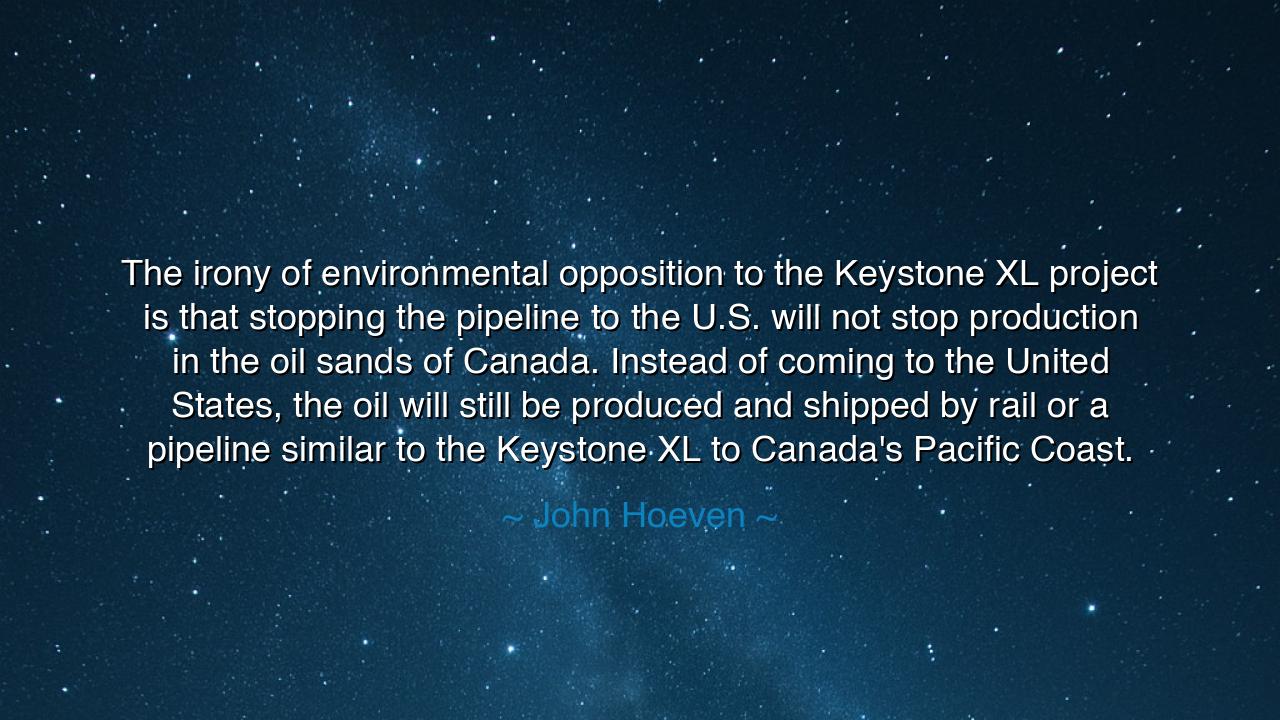
The irony of environmental opposition to the Keystone XL project
The irony of environmental opposition to the Keystone XL project is that stopping the pipeline to the U.S. will not stop production in the oil sands of Canada. Instead of coming to the United States, the oil will still be produced and shipped by rail or a pipeline similar to the Keystone XL to Canada's Pacific Coast.






Hear the words of John Hoeven, spoken amid the clash of politics, commerce, and the cries of the earth: “The irony of environmental opposition to the Keystone XL project is that stopping the pipeline to the U.S. will not stop production in the oil sands of Canada. Instead of coming to the United States, the oil will still be produced and shipped by rail or a pipeline similar to the Keystone XL to Canada’s Pacific Coast.” This utterance reveals the paradox of modern struggle: that one victory may prove hollow if the deeper forces remain unchallenged. For in the realm of energy, as in the affairs of nations, halting one road does not halt the journey, and turning away one stream does not dry the river.
The meaning is stark. Hoeven points to the Keystone XL pipeline, long a symbol of contention between industry and environmentalists. To its opponents, it was a serpent of steel threatening the land, waters, and climate. To its defenders, it was a lifeline of energy, jobs, and economic strength. Yet Hoeven, in sharp tone, declares the irony: that stopping this pipeline alone cannot halt the extraction of Canada’s oil sands. The oil, he says, will flow regardless—whether to the United States, to Asia, or to distant shores—because the demand remains, and where there is demand, there will be supply.
Consider the lesson of Prohibition in the United States, when laws sought to ban the production and sale of alcohol. Though noble in intent, it did not end drinking; instead, it gave rise to black markets, smuggling, and the power of organized crime. So too, Hoeven warns, may the opposition to a single pipeline prove symbolic rather than substantive, shifting the path of oil but not stopping its production. The irony lies in believing that to halt one channel is to halt the tide itself.
This truth, however, need not be a dismissal of environmental action, but a call to deeper wisdom. For if the true goal is to diminish the burning of fossil fuels and the destruction of climate, then the struggle cannot be won merely by opposing one project. It must reach to the roots of demand: the world’s hunger for energy, the choices of consumers, the policies of nations, and the development of alternatives. Without this broader vision, victories become fleeting, and industries find new doors where one has been closed.
History shows us the power of addressing the root. When nations turned from whale oil to kerosene and later to electricity, the whaling fleets that once darkened seas declined, not by protest alone, but by the rise of better, cheaper, and cleaner fuels. The whales were saved not simply by blocking ships, but by shifting the foundation of demand. In this lies a path for the environmental struggle: not only to resist, but to build—to champion energy that is both affordable and sustainable, so that the pipelines of oil no longer seem necessary.
The lesson for us is clear: noble causes must not stop at symbols. True victory is not in blocking one project, but in transforming the systems that give rise to many such projects. The cry for justice for the earth must be joined with the building of new ways—renewables, conservation, innovation—that render the old paths obsolete. Let protests be the trumpet that awakens the world, but let wisdom and invention be the hands that shape a new destiny.
Practical action flows from this: as citizens, demand policies that invest in clean energy; as consumers, support technologies that reduce dependence on oil; as communities, build resilience through conservation and innovation. Do not rest content with symbolic victories, but press on to the deeper work of change. For only then will the rivers of oil be slowed, and only then will the earth breathe freely again.
So let Hoeven’s words be taken not as mockery, but as a reminder. The irony of halting one pipeline while oil still flows elsewhere is real—but it need not breed despair. Instead, it should sharpen resolve, teaching us that the battle must be fought at the root, not merely at the branch. And when the roots are changed, the branches of industry will wither, and a new forest of clean energy shall rise in their place.






AAdministratorAdministrator
Welcome, honored guests. Please leave a comment, we will respond soon